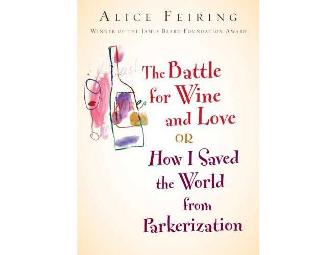THE BATTLE FOR WINE AND LOVE Or, How I Saved the World From Parkerization.

Item Number: 401
Time Left: CLOSED
Description
Wine writer Alice Feiring will provide a signed copy of her book, with an inscription to the winning bidder (or their designated giftee). Weimax will include a bottle of wine that's a Non-Parkerized bottling to go with the book.
Special Instructions
About 10 years ago, in an article about wine criticism in America, I referred to Robert M. Parker Jr. as the Alan Greenspan of the grapevine set. Rarely has one individual exerted so much power in a particular industry. Today, winemakers from Napa to New Zealand study Parker’s palate and create products aimed at making the great man smile. Not surprisingly, he’s a controversial figure. In “The Battle for Wine and Love: Or, How I Saved the World from Parkerization,” the journalist Alice Feiring rants about everything she finds distasteful in the wine industry — above all Parker, whom she seems to hold responsible for just about everything short of glacial melting.
To be sure, she addresses many vital issues: the dumbing down of wine for mass-market tastes, overreliance on science in winemaking, the demise of small-scale traditional winemakers and more. It’s just that Feiring’s sometimes dogmatic and self-congratulatory tone can get a little tiresome. There’s also a fair amount of insider jargon, so you might want to brush up in advance. Yet Feiring can be both lively and sardonic, especially when she’s portraying the many characters encountered on her mad dashes around Europe. “It was Sunday,” she writes of a meeting with a top Champagne winemaker. “Epernay was gray and still. In direct contrast was the jovial, hyper, bearded, unkempt, silver-haired and blue-eyed Pascal in his leprechaun-green jacket (which, he said, was the color of his winery).”
“The Battle for Wine and Love” is loosely organized, but that’s not a fault. Reading it is like taking a road trip with a smart-alecky friend who can’t stop talking about the wines you’re going to taste with dinner. And, refreshingly, this is one of the few books in this genre that focus on telling readers what not to drink. Toward the end, when Feiring finally decides to confront her archenemy, I couldn’t wait for the sparks to fly. Disappointingly, the encounter amounts to two brief, occasionally testy, telephone conversations, mostly of a technical nature. If there was a zinger, it came when Feiring asked Parker if the wine world had room for other critical opinions. “You know, I should be insulted,” he replied.
Do I hear ice melting?